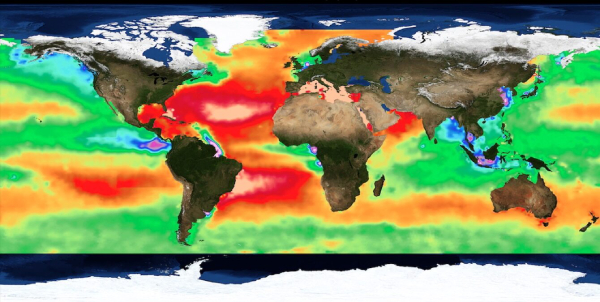Scientists have found that Earth may soon pass another planetary boundary, meaning it could be operating outside of the safe limits for seven of the nine defined planetary boundaries.
The Planetary Health Check report, prepared by the Potsdam Institute for Climate Impact Research (PIK), is a new assessment that determines the state of the planetary boundaries. For its first edition, the report found that Earth is near the boundary for ocean acidification.
“Our updated diagnosis shows that vital organs of the Earth system are weakening, leading to a loss of resilience and rising risks of crossing tipping points,” said Levke Caesar, scientist at PIK and a lead author of the report.
The planetary boundaries are a framework in which Earth has nine major areas that it can operate safely: climate change, biosphere integrity, land-system change, freshwater use, biogeochemical flows, novel entities, stratospheric ozone depletion, atmospheric aerosol loading and ocean acidification.
The framework was first developed in 2009 by Johan Rockström, former director of the Stockholm Resilience Centre and current director of PIK, along with 28 scientists from around the world. When the framework was introduced, scientists determined that Earth had passed three boundaries, including climate change, biosphere integrity and biogeochemical flows.
By 2023, scientists determined Earth had crossed three additional boundaries, including land-system change, freshwater use/change and novel entities, which includes plastics.
But now, ocean acidification is close to passing its boundary, putting marine life at risk. According to scientists, there are two main reasons for increasing ocean acidification.
“One is [that] the indicator for ocean acidification, which is the current aragonite saturation state, while still being in the safe operating space, is approaching the threshold of transgressing the safe boundary,” Caesar said, as reported by The Guardian. “The second is that there are actually several new studies that were published over the last years that indicate that even these current conditions may already be problematic for a variety of marine organisms, suggesting a need [to] re-evaluate which levels can actually be called safe.”
According to the data, climate change, biosphere integrity, biogeochemical flows, and novel entities have breached into high-risk zones, and the six breached boundaries have all worsened since the last evaluation of the boundaries. The atmospheric aerosol loading boundary has improved slightly overall, but the authors warned that some areas are still seeing increases because of factors such as deforestation, industrial emissions and wildfires.
“The overall diagnostic is that the patient, Planet Earth, is in critical condition. Six of nine Planetary Boundaries are transgressed. Seven PB processes show a trend of increasing pressure so that we will soon see the majority of the Planetary Health Check parameters in the high-risk zone,” Rockström said of the most recent report.
Scientists plan to publish a Planetary Health Check report annually to monitor progress on the boundaries on the planetary boundaries and help work toward reversing human impact on the planet. Further, the Planetary Boundaries Science (PBScience) initiative led by Rockström will incorporate knowledge from Indigenous communities on how to be better stewards of the planet.
“For centuries, Indigenous Peoples have lived in harmony with the land, learning how to use the environment to support themselves and to replenish what is taken for the overall health of Earth,” Hindou Oumarou Ibrahim, chair of the Planetary Guardians, said in a statement. “We are killing ourselves with overdoses of chemicals, destruction of nature, skyrocketing temperatures, and increasing pollution. As industry has accelerated, Indigenous Peoples have seen their homes degraded and destroyed. It is imperative that this decline is reversed.”
Author
Based in Los Angeles, Paige Bennett is a writer who is passionate about sustainability. She earned her Bachelor’s degree in Journalism from Ohio University and holds a certificate in Women’s, Gender and Sexuality Studies. She also specialized in sustainable agriculture while pursuing her undergraduate degree.




